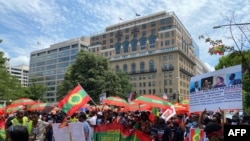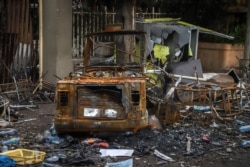While Ethiopia’s government is blaming the insurgent Oromo Liberation Army for last month’s shooting death of a popular singer, which sparked days of violent unrest, the OLA’s commander denies any responsibility and says the administration itself is culpable.
“Our struggle is to create a country where people can speak freely. We don’t kill people because they speak their mind,” Kumsa Diriba, commonly known as Jaal Maro, told VOA’s Horn of Africa service in a phone interview Wednesday.
Hachalu Hundessa was fatally shot June 29 in a suburb of the capital, Addis Ababa. The 34-year-old activist singer’s music had served as a soundtrack to anti-government protests that helped bring Prime Minister Abiy Ahmed to power in April 2018. He belonged to the Oromo ethnic group, Ethiopia’s largest, which has pressed for self-rule of the country’s vast Oromia state and for establishing Afaan Oromo as the national language.
In announcing the arrests of three suspects last week, Attorney General Adanech Abebe blamed Hachalu’s killing on the OLA, an armed faction that broke away from the Oromo Liberation Front in 2018. In a phone interview Monday, she told VOA that the suspects confessed to being directly ordered by the OLA to kill the singer to foment violence between ethnic groups — in this case, Oromos and Amharas.
“We found death threat text and voice messages on Hachalu’s cellphone that came from a person who describes himself as a member of OLA/Shene,” Adanech said, using the government’s name for the group. “A woman who was with Hachalu at the time of his death also identified the killer.”
The OLA has battled with Ethiopia’s military in Western Oromia for the last two years. The Abiy administration accuses the insurgent group of attacking and killing civilians in Oromia and Southern Nations.
Deadly violence
The violence in the hours following Hachalu’s slaying was the deadliest since Abiy took office. Ethiopian authorities told VOA that at least 166 civilians and 11 police officers were killed, revising an earlier report of 239 deaths.
Witnesses told VOA that roving bands of young men armed with guns, machetes and other weapons sought out ethnic and religious targets, primarily non-Oromos. Attacks against people and property took place in some 40 Oromia districts, VOA confirmed with authorities.
Shashemene, a city of that lies 200 kilometers south of the capital, experienced broad destruction, local authorities said. Schools and other buildings, including a hotel owned by retired track star Haile Gebrselassie, an Olympic gold medalist, were burned down.
Yohannes Wolde, who owns Lucy, the city’s first private education center, said arsonists destroyed one of its five locations. That site had 350 employees who supported education for more than 4,200 students.
“When I heard they were burning the school, I evacuated my family from my house and went hiding. Soon after, they also came to my house and burned it,” Yohannes told VOA.
Some 40 Oromia districts were affected.
Tense environment
The violence has subsided, but tensions remain, police say.
Kumsa, the 50-year-old commander, said the OLA controls Western Oromia and has operational bases throughout the country, but he denied any involvement in attacks on civilians. He said the government’s accusations against his group were fabricated.
“Protecting citizens from such mob attacks is a responsibility of the government,” he said.
Taye Dendea, spokesman for the ruling Prosperity Party, dismissed OLA’s denial of involvement.
“We don’t expect an insurgent group that works to destabilize the government would claim responsibility,” he told VOA in a phone interview. “OLA also denied other unspeakable acts they committed against innocent civilians in Oromia. But the community knows what they did.”
On Wednesday, the government partially lifted the internet shutdown imposed following Hachalu’s death. Adanech said the shutdown was necessary to block calls for attacks that were spreading through social media and creating confusion or worse.
“Such disinformation is aimed at inciting violence among Ethiopians,” she said, warning people to be wary of “misinformation and random speculation,” some of which is disseminated for political gain.
Tsion Girma and Habtamu Seyoum of VOA's Horn of Africa service contributed to this report.





